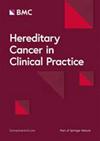Gastrointestinal manifestations in patients with gastric adenocarcinoma and proximal polyposis of the stomach (GAPPS): a systematic review with analysis of individual patient data
IF 2.4
4区 医学
Q3 ONCOLOGY
引用次数: 0
Abstract
Gastric adenocarcinoma and proximal polyposis of the stomach (GAPPS) is an autosomal dominant syndrome characterized by fundic gland polyps (FGP) as well as an increased risk of gastric cancer. The syndrome has been recognized as a clinical entity for less than a decade. A clinical suspicion may be complex and can vary from incidental findings of FGPs at gastroscopy to obstructive symptoms with dyspepsia and vomiting. The diagnosis is established by genetic detection of a pathogenic variant in the promotor 1B region of the APC gene. As of yet there are no established clinical criteria for the diagnosis. To increase knowledge of the condition and to discuss possible genetic testing and surveillance strategies, we performed a systematic review of all reported patients with GAPPS. This review was organized according to PRISMA guidelines. The search, which was conducted on September 7th, 2023, was applied to MEDLINE and restricted to only humans and papers in the English language. Only the studies on patients/families with GAPPS verified by identification of a pathogenic variant in the APC promoter 1B were included. Twelve publications with a total of 113 patients were identified. In all instances the diagnosis was genetically verified with reports of four different variants within the APC promotor 1B region. Eighty-eight patients (90.1%) had gastric polyps, of these seven patients had low-grade dysplasia and five patients had both low- and high-grade dysplasia. Thirty-seven patients (45.7%) underwent gastrectomy. There were no reports of duodenal polyps (0%). Gastric cancer was found in 31 patients (30.1%) with a median age of 48 years (range 19–75). Twenty-six patients died (23.2%) of which 19 had developed gastric cancer (73.1%). One patient was diagnosed with metastatic colorectal cancer (2.2%) and died at 73 years of age. Nineteen patients had colorectal manifestations with < 20 polyps (41.3%). Patients with a pathogenic variant in the APC promoter 1B region have an increased risk of gastric polyposis and early-onset gastric cancer. However, there is considerable variation in clinical expression and penetrance, which makes decisions on surveillance and the timing of prophylactic gastrectomy challenging.胃腺癌和胃近端息肉病(GAPPS)患者的胃肠道表现:系统回顾与患者个体数据分析
胃腺癌和胃近端息肉病(GAPPS)是一种常染色体显性遗传综合征,以胃底腺息肉(FGP)和胃癌风险增加为特征。该综合征被确认为临床实体还不到十年。临床怀疑可能很复杂,从胃镜检查偶然发现胃底腺息肉到出现消化不良和呕吐的梗阻性症状都有可能。通过基因检测 APC 基因启动子 1B 区的致病变体可确定诊断。到目前为止,还没有确定的临床诊断标准。为了增加对该疾病的了解,并讨论可能的基因检测和监控策略,我们对所有报道的 GAPPS 患者进行了系统性回顾。本综述按照 PRISMA 指南进行组织。检索于 2023 年 9 月 7 日在 MEDLINE 上进行,仅限于人类和英文论文。仅纳入了通过鉴定 APC 启动子 1B 中的致病变异而验证的 GAPPS 患者/家属的研究。共发现 12 篇论文,涉及 113 名患者。在所有情况下,诊断都是通过 APC 启动子 1B 区域内四种不同变体的报告进行基因验证的。88名患者(90.1%)患有胃息肉,其中7名患者患有低度发育不良,5名患者同时患有低度和高度发育不良。37名患者(45.7%)接受了胃切除术。没有十二指肠息肉的报告(0%)。31名患者(30.1%)发现胃癌,中位年龄为48岁(19-75岁不等)。26 名患者死亡(23.2%),其中 19 人罹患胃癌(73.1%)。一名患者被诊断为转移性结直肠癌(2.2%),享年 73 岁。19名患者的结直肠表现为息肉小于20个(41.3%)。APC 启动子 1B 区致病变异患者罹患胃息肉病和早发胃癌的风险增加。然而,该病的临床表现和渗透性差异很大,这使得有关监测和预防性胃切除术时机的决策具有挑战性。
本文章由计算机程序翻译,如有差异,请以英文原文为准。
求助全文
约1分钟内获得全文
求助全文
来源期刊
CiteScore
3.10
自引率
5.90%
发文量
38
审稿时长
>12 weeks
期刊介绍:
Hereditary Cancer in Clinical Practice is an open access journal that publishes articles of interest for the cancer genetics community and serves as a discussion forum for the development appropriate healthcare strategies.
Cancer genetics encompasses a wide variety of disciplines and knowledge in the field is rapidly growing, especially as the amount of information linking genetic differences to inherited cancer predispositions continues expanding. With the increased knowledge of genetic variability and how this relates to cancer risk there is a growing demand not only to disseminate this information into clinical practice but also to enable competent debate concerning how such information is managed and what it implies for patient care.
Topics covered by the journal include but are not limited to:
Original research articles on any aspect of inherited predispositions to cancer.
Reviews of inherited cancer predispositions.
Application of molecular and cytogenetic analysis to clinical decision making.
Clinical aspects of the management of hereditary cancers.
Genetic counselling issues associated with cancer genetics.
The role of registries in improving health care of patients with an inherited predisposition to cancer.

 求助内容:
求助内容: 应助结果提醒方式:
应助结果提醒方式:


